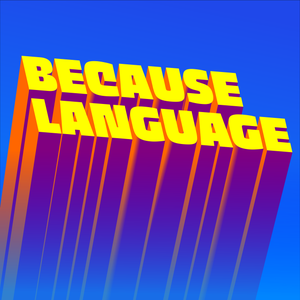
Because Language - a podcast about linguistics, the science of language.
Daniel Midgley, Ben Ainslie, and Hedvig Skirgård
- 1 hour 42 minutes111: Words of the Week of the Year 2024 (live with Mignon Fogarty and friends)
It's our Words of the Year episode, where we do a vibe check on all the words and name one of them our Because Language Word of the Year. We're joined by Grammar Girl Mignon Fogarty and a lot of friends and supporters. It's going to be weird. It's going to be brat. You know we're going to eat that.
Timestamps
- Cold open: 0:00
- Intros: 0:54
- All the words from everywhere: 10:58
- Related or Not: 43:28
- Words from Mignon and James: 58:50
- Our Words of the Week of the Year: 1:13:23
- The Reads: 1:33:40
- Outtakes: 1:39:29
21 December 2024, 1:41 pm - 2 hours 35 minutes109: Language Oppression in Tibet (with Gerald Roche and Sasha Wilmoth)
Minority languages are under threat everywhere, but Tibet represents a particularly difficult challenge. The Tibetan language family is under pressure from (no surprise) Mandarin, even as community support for Tibetan remains high. But where does that leave the many other minority languages of the area, like Manegacha? Language policy, community pressure, and individual language choice are coming together in a turbulent mix. Is there any place for hope in this setting? Dr Gerald Roche tells us about this unique situation, drawing from his new book The Politics of Language Oppression in Tibet.
Daniel chats with Dr Sasha Wilmoth about a very surprising sentence, and how our brains process language in some surprising ways.
Timestamps
Cold open: 0:00 Intros: 0:55 News: 5:30 Chat with Sasha Wilmoth: 21:30 Related or Not: 39:40 Interview with Gerald Roche: 54:40 Words of the Week: 2:02:56 The Reads: 2:29:16 Outtakes: 2:32:56
6 December 2024, 2:11 am - 1 hour 24 minutes108: Mailbag of Etymology (with Douglas Harper)
We're joined for the first time by Douglas Harper, proprietor of the world-renowned Online Etymology Dictionary (etymonline.com). He's here to help us with our Mailbag questions, and even test us in a game of Related or Not.
In our Mailbag this time:
- What's the difference between DEPENDENCE and DEPENDENCY?
- Why is TONGUE spelled that way?
- What does it mean if reciting a tongue twister in your mind is just as hard as saying it out loud?
- Why is STYGIAN the adjective form of the River Styx?
- Why are WHY and BECAUSE the same in some languages?
Timestamps
- Cold open: 0:00
- Intros: 2:01
- Questions for Douglas Harper: 9:16
- Mailbag questions 1: 24:00
- Related or Not: 41:24
- Mailbag questions 2: 1:03:20
- Comments: 1:14:18
- The Reads: 1:18:00
- Outtakes: 1:22:47
16 November 2024, 4:35 pm - 2 hours 7 minutes107: Linguaphile (with Julie Sedivy and Matt Spike)
Language is a lot like love. You can enjoyably lose yourself in both. They can both be dangerous. And they both entail a responsibility to keep each other safe. A new book Linguaphile: A Life of Language Love is both a language book and a memoir, connecting the strands of language learning, language love, and language loss. Daniel speaks with author Dr Julie Sedivy.
Also: Large language models have proven adept at duplicating patterns of language that humans find possible. But what about impossible language patterns? Can LLMs learn those? And what even is an impossible language? Dr Matt Spike explains.
Timestamps
- Cold open: 0:00
- Intros: 0:34
- News: 5:49
- Interview with Matt Spike: 32:01
- Related or Not: 50:57
- Interview with Julie Sedivy: 1:05:34
- Words of the Week: 1:33:33
- The Reads: 1:55:04
- Outtakes: 2:01:21
29 October 2024, 7:51 am - 1 hour 36 minutes105 or 500 (live with Kelly Wright and friends)
For our 500th episode, we got together with our great listeners for their words, stories, and inspiration. It's a look back at the show, a look at language from our friends' point of view, and a celebration of our great community. Dr Kelly Wright joins us.
Big thanks to our friends who joined us, and to everyone who's listened over the years.
Watch the video here: https://youtu.be/Xc0S_O4KrhY
Timestamps
Cold open: 0:00 Intros: 1:17 News: 9:19 PharaohKatt tells us about Speech Pathology Week 2024: 27:00 Related or Not (with polls!): 40:23 Words of the Week: 56:52 Self-indulgent twaddle about the show and thank yous: 1:23:16 The Reads: 1:30:50 Outtake: 1:35:24
15 September 2024, 2:10 pm - 1 hour 44 minutes104: Dogwhistles (with Elin McCready, Lizzy Hanks, Jesse Egbert, and Rikker Dockum)
Can you hear them? Only if you're meant to. Political dogwhistles exploit lack of knowledge in one group to send a coded message to another group. But that's just the beginning. How are dogwhistles different from slurs? How do they licence behaviour? Do progressives dogwhistle? Dr Elin McCready is the author of Signaling Without Saying: The Semantics and Pragmatics of Dogwhistles.
We're also joined by Lizzy Hanks and Dr Jesse Egbert, who are working on the LANA-CASE corpus, a huge corpus of conversational English. It aims to bring representation to a diverse group of English speakers, and they're looking for contributors.
Dr Rikker Dockum is our special guest host.
Timestamps
- Intros: 0:00
- News: 3:01
- Interview with Lizzy Hanks and Jesse Egbert: 16:47
- Related or Not: 35:45
- Interview with Elin McCready: 45:57
- Words of the Week: 1:17:47
- The Reads: 1:39:43
26 August 2024, 6:41 am - 2 hours 20 minutes103: Unequal Englishes (with Ruanni Tupas and Nicole Holliday)
There are lots of Englishes out there, but the way we approach varieties of English sets learners up to fail. How do we combat language ideologies out there in the world — and in our own minds? Dr Ruanni Tupas is the editor of an important new book: Investigating Unequal Englishes: Understanding, Researching and Analysing Inequalities of the Englishes of the World.
We're joined by our special guest host Dr Nicole Holliday, and we are tackling a torrent of words — political and not — that the current news cycle has thrown at us.
Timestamps
- Intros: 0:44
- Words of the Week (coconut, weird, brat): 12:41
- Related or Not: 55:25
- Interview with Ruanni Tupas: 36:36
- More Words of the Week (International Blue Screen Day / Crowdstrike, rawdogging, fedupedness, combining form -nomenon, fridgerton): 1:53:43
- Comments: 2:11:15
- The Reads: 2:13:47
3 August 2024, 7:03 am - 2 hours 45 minutes102: Signed Language Mailbag (with Adam Schembri, Christy Filipich, and Mark Ellison)
What do signed languages have in common? How do oral languages influence signed languages? How do they influence each other? Here to answer these questions and many more, it's Dr Adam Schembri of the University of Birmingham.
You can watch our chat with Adam Schembri on video, with Christy Filipich doing Auslan interpretation.
That video is here: https://youtu.be/GcV0218VJ2k
Also joining us as a special guest: Dr Mark Ellison.
Timestamps
- Intros: 0:38
- News: 3:33
- Related or Not: 54:15
- Interview with Adam Schembri: 1:05:31
- Words of the Week: 2:08:27
- Comments: 2:27:56
- The Reads: 2:31:21
- Listener comment: 2:39:33
27 July 2024, 12:49 am - 2 hours 27 minutes101: Talkin' Chomsky (with Katie Martin and Abduweli Ayup)
Noam Chomsky is one of the world's foremost thinkers, and his impact on linguistics is incalculable. Yet many people are only familiar with his political activism. What are his linguistic ideas, and why have they been so tenacious?
To answer that question, Daniel had a delightful chat with generative syntactician and Chomsky fan Katie Martin.
We're honoured to have a chat with linguist and Uyghur language activist Abduweli Ayup, recipient of the 2024 Language Rights Defenders Award from the Global Coalition for Language Rights.
Timestamps
- Intros: 0:41
- News: 10:10
- Interview with Abduweli Ayup: 37:36
- Related or Not: 57:50
- Interview with Katie Martin: 1:06:56
- Words of the Week: 1:59:29
- The Reads: 2:15:53
- Outtakes: 2:22:21
8 July 2024, 6:36 am - 2 hours 8 minutes99: Gender in Germany (with Rob Tegethoff and Ciarán from Corner Späti)
What's going on in Germany? How are people talking about gender in the German language, and how is freedom of expression being handled? We have a couple of German experts — linguist Rob Tegethoff and Ciarán of the podcast Corner Späti — to tell us why other languages were banned at protests in Berlin, and what right-wing activists get from involving language in their plans.
Timestamps
Intros: 0:34 News: 5:16 Related or Not: 26:29 Interview with Rob and Ciarán: 44:37 Words of the Week: 1:46:42 The Reads: 2:02:50 Outtakes: 2:06:23
11 June 2024, 10:19 am - 1 hour 43 minutes98: Origin Uncertain (with Anatoly Liberman)
How much can we really know about the words we use? What are the facts behind some of the most tangled etymologies in English? And is our "Related or Not" game a good way of approaching word history?
We're talking to Dr Anatoly Liberman, perhaps the world's preëminent living etymologist and the author of Origin Uncertain: Unraveling the Mysteries of Etymology.
20 May 2024, 3:09 am - More Episodes? Get the App
Your feedback is valuable to us. Should you encounter any bugs, glitches, lack of functionality or other problems, please email us on [email protected] or join Moon.FM Telegram Group where you can talk directly to the dev team who are happy to answer any queries.
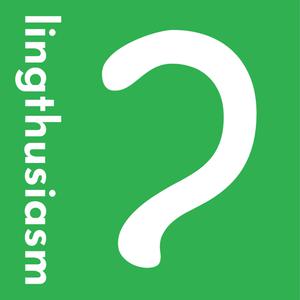 Lingthusiasm - A podcast that's enthusiastic about linguistics
Lingthusiasm - A podcast that's enthusiastic about linguistics
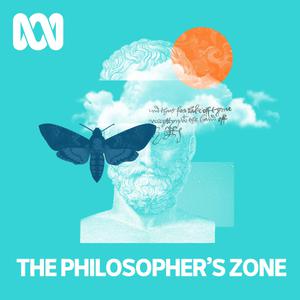 Philosopher's Zone
Philosopher's Zone
 Lexicon Valley from Booksmart Studios
Lexicon Valley from Booksmart Studios
 Slate Debates
Slate Debates
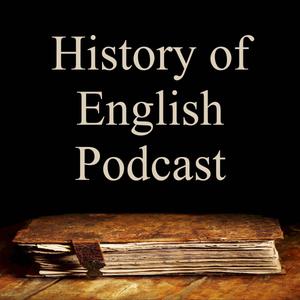 The History of English Podcast
The History of English Podcast
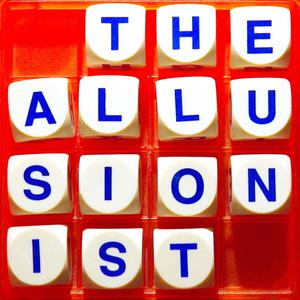 The Allusionist
The Allusionist